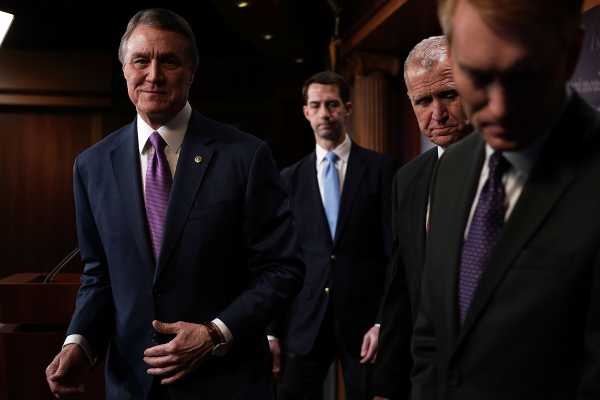
Every immigration proposal President Donald Trump’s White House has supported has made drastic cuts to the legal immigration system. But in the Capitol, the idea is not so popular — even among the Republican senators supporting Trump’s vision on immigration.
“I am fine leaving the numbers where they are, for me personally,” said Sen. James Lankford (R-OK), one of the co-sponsors of a bill that mirrors Trump’s immigration framework and would cut legal immigration by up to 40 percent.
The White House’s latest proposal calls for a path to citizenship for 1.8 million undocumented immigrants who came to the country as children, also known as DREAMers. In exchange, it would fund the border wall, end the diversity visa lottery program, and make such substantial cuts to family immigration — to stop “chain migration” — that critics say it would gut the legal immigration system.
Lankford and Republican Sens. Chuck Grassley (IA), Thom Tillis (NC), David Perdue (GA), Tom Cotton (AR), Joni Ernst (IA), and Majority Whip John Cornyn (TX) have all lined up behind a proposal that reflects these White House’s priorities.
In conversations with five of the proposal’s seven sponsors, only one — archconservative Cotton — gave a full-throated defense of cutting legal immigration among low-skilled workers. Several were quick to say the bit of the bill that cut legal immigration numbers could be changed. Others listed possible reforms to the legal immigration system that weren’t in the bill at all — and may or may not materialize in the future.
Beyond the sponsors of White House-backed proposals, many more Republicans have balked at the legal immigration cuts. Sen. Lindsey Graham (R-SC), who has been negotiating on behalf of DREAMers, said it’s ”bad for the economy.” Sen. Jeff Flake (R-AZ) has since come out with a proposal that would amend Trump’s framework to keep legal immigration levels where they are.
There are a lot of reasons Republicans — and Democrats — are opposed to legal immigration cuts. As Vox’s Matt Yglesias writes, a majority of economists agree more immigration raises incomes on average for native-born workers:
And while there is a reasonable debate to be had over the benefit of a merit-based immigration system — whether it’s better to issue visas based on family ties, versus job skills — that’s not what lawmakers are currently negotiating.
As senators ramp up their deliberations on immigration this week to find a legislative fix for the soon-ending Deferred Action for Childhood Arrivals program, which Trump promised to sunset on March 5, it’s clear that cuts to legal immigration will continue to be a point of contention for Republicans. I asked seven Republican senators, many sponsoring the White House’s proposal, what they made of the cuts. Here are the transcripts of our conversations, some lightly edited for clarity.



Sen. James Lankford (R-OK): “I’m open to keeping the numbers as it is”
Tara Golshan
A lot of your Republican colleagues have raised some concerns about the cuts to legal immigration, why [the plan] moves forward with that. I’m curious why you think that’s a good way forward.
James Lankford
It is the initial proposal, and as with all these proposals that were mentioned in there, people can bring amendments and let’s debate that out. We have disagreements even within the group of us that were helping to be able to craft this and put some legislative language to what [Trump] sees as his proposal. Some people disagree on that, so that’s something we can debate out on the floor.
Tara Golshan
So what’s your case to [your Republican colleagues] that this is a good way forward?
James Lankford
The real focus for us is let’s go make law. The Senate went through this in 2013, when they did a tremendous amount of work and it went nowhere. I am concerned that the Senate does a bunch of work and has a bunch of debate and they pass something that the House says absolutely no way, and we have the same result again. Or at the end of it, everyone points at everyone and says it’s their fault. So let’s get on a bill and amend it.
Tara Golshan
But specifically on moving forward [with a bill] that would cut legal immigration, what is your defense of that to your colleagues? Why do you support it?
James Lankford
I’m open to keeping the numbers as it is.
Reporter
So why should we reduce the numbers?
James Lankford
Let me put it this way: I am fine leaving the numbers where they are, for me personally. This is a preference of the White House. But again, there is going to be wide-open debate on it. First things first, let’s get on something that’s actually a vehicle that we can actually start moving on and trying to make adjustments on. So let’s get on it; let’s make amendments and talk it through.
Tara Golshan
Is that something your co-sponsors would support?
James Lankford
You’d have to ask all of them — and the White House.
Tara Golshan
Sen. Grassley said you all had four meetings with the White House on this proposal. Did you get any indication that the White House was willing to keep the levels of legal immigration where they are?
James Lankford
I’ll let you talk to the White House directly.
Tara Golshan
Well, from your sense in the room —
James Lankford
I’m not going to talk about private conversations. The White House has met with everyone — House, Senate, Republicans and Democrats. They have had lots of meetings.
Tara Golshan
Right, but your pitch is that you have a bill that can become law so you have a sense of all the steps to that. You are saying you are also open to changing this one aspect of the bill. So I am just curious, how much can you see that changing while also being able to make the pitch that this can become law?
James Lankford
I think it’s going to be an ongoing conversation that happens all week long. Every amendment that’s proposed will have to be dialed back and forth with the White House. Because if this passes out of the Senate, which I certainly hope it does, the White House has to be engaged with the House, we certainly have to be engaged with the House. If something passes out of the Senate that the White House doesn’t approve, they certainly have the skills —
Tara Golshan
And to be clear, on this issue of legal immigration, you are okay with the levels being cut and staying where it is.
James Lankford
Yeah. I think when you talk about the levels being cut, just to be clear, that leaves the impression that next year the numbers go down. The thing that we focus on is the family backlog, combing it in — that’s a decade away. You get a decade away, the numbers start going down, that’s the same time you have 2 million people or 1.8 million people coming into the process. So when you are talking about numbers coming down, that’s 15 years away. So that’s why that’s not an issue to me. That gives us plenty of time as Congress to be able to have whatever resolution we want to have.
But numbers don’t come down for a decade and a half. I know that accusation is out there that this is slashing numbers and this is dealing with legal immigration. That’s a problem that’s a decade and a half away that Congress has the opportunity to fix or make adjustments when they need to.
Sen. John Cornyn (R-TX): “I don’t know what the appropriate level is of legal immigration”
Tara Golshan
Many of your Republican colleagues have expressed concerns that the Grassley bill that you are on as well makes cuts to legal immigration. Why is that good policy?
John Cornyn
I don’t know what the appropriate level is of legal immigration. I think there’s two parts of that; we ought to look at more merit-based immigration. We will always have family-based immigration policy, and indeed, we provide for the nuclear family, but we ought to also look at people with skills and education and talents that we need in our country, and so this is the beginning of that conversation. But the first vote is just to get on the bill. People who have amendments — and I expect there will be some — I saw Sen. [Jeff] Flake (R-AZ) had some things he was discussing this morning in Politico.
Tara Golshan
Do you think the White House has leeway on this particular issue?
John Cornyn
Well, the president said what he wants, and we will see what is feasible. We all have to reconcile ourselves between what we want and what is actually possible.
Tara Golshan
So the answer to the legal immigration cuts question is that —
John Cornyn
If people don’t like what the proposal is, then they can amend it.
Tara Golshan
Okay […]
So just to clarify, on the legal immigration front, you don’t have a position on where the levels should be. Whether they should be cut or stay where they are.
John Cornyn
I think that’s a fair subject for debate. What should be the level? We are the most generous country in the world.
Tara Golshan
What about you? Where do you stand in that debate?
John Cornyn
I said it’s something we ought to debate.
Sen. Tom Cotton (R-AR): “I think it’s certainly critical that we reduce unskilled and low-skilled workers”
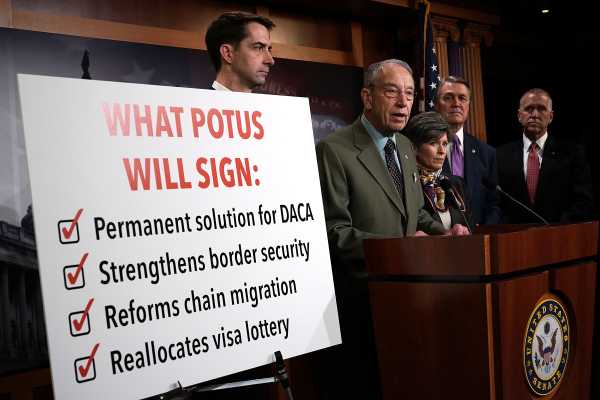

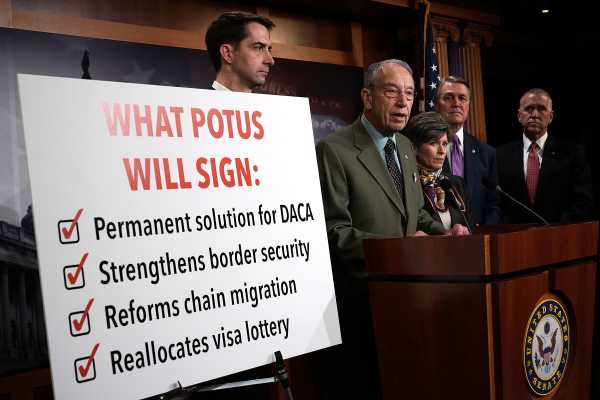
Tara Golshan
I have talked to a lot of Republicans today that are concerned with the cuts to legal immigration, and I was wondering what you have been telling them to assuage their concerns.
Tom Cotton
Um. Well, any decline, initially, will be very modest. Maybe 10 percent, probably still above where it was as recently as 2013, because the surge in the late Obama years [was] driven by massive increases in refugees and asylees. Over time as The family categories are cleared out through the backlog; you will see a larger increase [in cuts to legal immigration], but you are talking eight to 10 years out. That’s more than enough time, and would give them reason to try and change the legal immigration system to adopt something like the RAISE Act, which would address some of the concerns we have over large numbers of low-skilled or unskilled workers.
Tara Golshan
Do you think cutting legal immigration numbers overall is good policy?
Tom Cotton
I think it’s certainly critical that we reduce unskilled and low-skilled workers. It can’t both be true — which, a lot of people say both propositions — that we need both more unskilled and low-skilled workers, but robots are going to take all the jobs.
Tara Golshan
And you’re in the camp, as you said yesterday in the press conference, that this is the best and final offer from the White House. So you don’t see much wiggle room on this front.
Tom Cotton
We have been in this boat now for five and a half months, and the president’s framework proposal took ideas from a lot of different bills to include Democratic bills and put together what is a reasonable and sensible compromise. We’ve got the legalization, ultimately citizenship, for 1.8 million people — surprising for a lot of Democrats, coming from Donald Trump — and then you’ve got in the other hand the measures to mitigate the consequences from that decision. That’s why you need money for border security; that’s why you need legal authority to allow border agents to secure the border.
And second, you’ve got to end chain migration so [the] newly legalized immigrant population can’t legalize their entire family to include their parents that brought them here illegally in the first place.
Tara Golshan
So amendments that would bring on more Republicans to this proposal, like the Flake amendment, which would just limit the chain migration changes to DREAMers is not something you think —
Tom Cotton
Well, I don’t think I could support that, and I don’t think the White House would, because that’s unlikely to withstand legal scrutiny. Democrats often try to pass immigration bills with language that they know will be struck down by courts as a violation of due process or equal protection. And that proposal, if you try to limit chain migration just to the legal population, what you would do is create two classes of citizens — one that can naturalize parents and their siblings and adult kids, and another class that would not. There’s a real legal question that wouldn’t stand up.
Tara Golshan
The case you are making is: Hey, we don’t have to have legal immigration cuts; we just have to address this in the next 10 years.
Tom Cotton
If they’re worried about levels of legal immigration, then they have a long time until we have a substantial decline. I would also say if even in the biggest estimates of the decline you get over 10 to 12 years of legal immigration, it would still be above the Clinton-era average of about 780,000.
Tara Golshan
You don’t think it would negatively impact the economy, like many critics are —
Tom Cotton
I think it would improve the economy, because the people who work with their hands and work with their feet would see wage increases for the first time in 40 years. Now at the same time, we should change our legal immigration system so we are attracting more high-skilled immigrants. But that’s a separate question for another time.
Sen. Chuck Grassley (R-IA): “I think that in order to sell this and move to merit-based immigration, and that will be a ways down the road, you have to end it”
Tara Golshan
A lot of Republicans colleagues have expressed some concerns about cuts to legal immigration. What are you saying to them to assuage their concerns?
Chuck Grassley
I think that in order to sell this and move to merit-based immigration, and that will be a ways down the road, you have to end it. We are keeping nuclear family — and that ought to be the concern of everybody.
Tara Golshan
Are cuts to legal immigration good immigration policy?
Chuck Grassley
Well, first of all, we grandfather in everybody. So I don’t think there ought to be a concern as long as people are standing in line getting here.
Sen. Joni Ernst (R-IA): “I think that we look at other visa issues”
Tara Golshan
There are a lot of Republicans colleagues who have raised concerns with the cuts to legal immigration. That would be a factor in the bill you have come forward with. I was wondering: What are you saying to them to assuage their concerns?
Joni Ernst
And I think that we look at other visa issues as well and mak[e] sure that we are promoting the visa — work visa — so we are able to fill our labor pools.
Tara Golshan
That’s something that will come down the line.
Joni Ernst
We think so.
Tara Golshan
So you don’t support something that cuts legal immigration?
Joni Ernst
Well, I am going to look at the entire picture, and I think we are going to have some pretty robust debate on that.
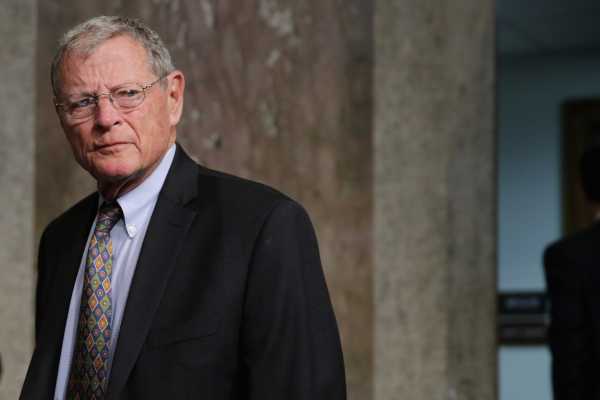

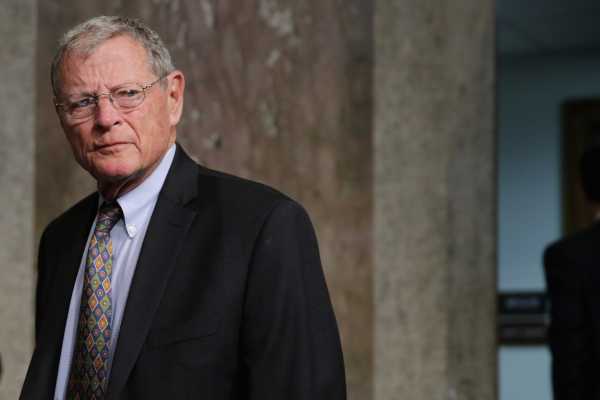
Sen. James Inhofe (R-OK): “I don’t like cuts to legal immigration.”
Tara Golshan
On the White House’s immigration proposal, there are a lot of Republicans colleagues who have raised concerns about cuts to legal immigration. I was wondering how you stand on cuts to legal immigration.
James Inhofe
I don’t like cuts to legal immigration. I have been the speaker at naturalization ceremonies, and there is nothing more heartwarming than to see people who are learning the language, learning the history, and doing all that, and I have always been a real supporter of encouraging that.
Tara Golshan
Are you concerned that cuts to legal immigration have been part of every White House proposal so far?
James Inhofe
No, I just am not sure that I agree with it. And I haven’t heard the argument from that side.
Sen. Mike Rounds (R-SD): “I really do think we need more immigration”
Tara Golshan
I wanted to ask on the legal immigration front —
Mike Rounds
The legal immigration front?
Tara Golshan
Yeah. The bill that’s been put forward by Grassley and Cornyn would cut legal immigration in the long run. I’m curious how you see your party positioning on this issue.
Mike Rounds
I think there is a different point of view in our party. Some of us are recognizing that we need legal immigration. I am one of them who believes that legal immigration is important. Even if we want to maintain our current population, we have to have legal immigration. I really am more interested in finding a way to shorten the lines and to find a way to give the people who are legally in line the opportunity to migrate.
Tara Golshan
Are you concerned that cutting legal immigration has been part of every White House proposal on immigration so far?
Mike Rounds
You know, I think it is a very conservative starting point and it gives us room to work. I think Dems have expressed an interest in a really expansive immigration system. There’s some middle ground.
Tara Golshan
So you are not concerned that this is necessary for Trump to sign on?
Mike Rounds
Well, I don’t think that’s part of his pillars.
Tara Golshan
That’s not synonymous with what the chain migration [reforms are doing?] —
Mike Rounds
Well, the problem with the current system where you have people with familial ties coming through, extended familial ties — if you agree that the total number that we are letting in is the right number, that takes away from the number of people coming in on their own merit. And so there’s a lot of us who prefer people coming in on a merit-based system and allow those individuals who have a family connection to still come in, but to come in on their own merits and be in line with everyone else.
Tara Golshan
Those reforms aren’t being discussed in this debate.
Mike Rounds
I think everything is being discussed.
Tara Golshan
So you think those reforms will be addressed in this bill? I hear everyone trying to narrow the conversation down.
Mike Rounds
We are.
But there is a difference between the H-2Bs, which we really need in a lot of parts of our country because of the need for workers during the warmer part of the year and so forth, and the tourism industry and so forth. That part, we are looking at and saying we need more of those workers. They come in, work, and then they go home again.
On the other hand, you have people who have a merit, they have an offer for a job already, they have a high school education or more and so forth — very, very employable. And those individuals are in a big, long line. but you have someone who is a family member, who may not have the merits and would struggle to find a job here, who can get in line above them. And that, I think, is what we are trying to address. I don’t know if we can address it, but anything that can move more toward a merit-based system makes it easier for the president to sign on to a plan.
Tara Golshan
Would you sign on to any proposal that would result in legal immigration cuts?
Mike Rounds
No. I’m not interested in that at this time. I really do think we need more immigration — legal immigration. Because if we don’t have a legal immigration system that works, then people try to cut the corners and they try to come in illegally.
Sourse: vox.com
0.00 (0%) 0 votes

































